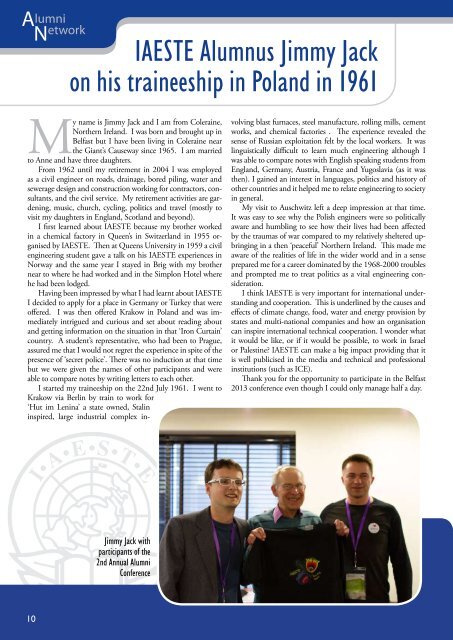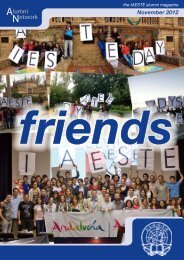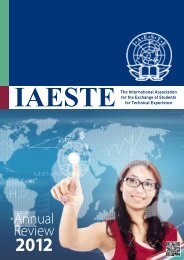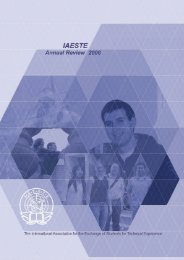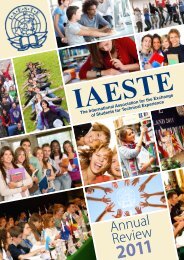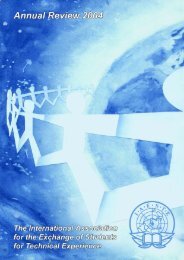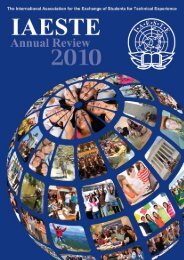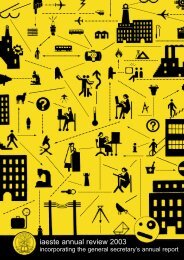View the latest issue - IAESTE
View the latest issue - IAESTE
View the latest issue - IAESTE
You also want an ePaper? Increase the reach of your titles
YUMPU automatically turns print PDFs into web optimized ePapers that Google loves.
Alumni<br />
N etwork<br />
<strong>IAESTE</strong> Alumnus Jimmy Jack<br />
on his traineeship in Poland in 1961<br />
My name is Jimmy Jack and I am from Coleraine,<br />
Nor<strong>the</strong>rn Ireland. I was born and brought up in<br />
Belfast but I have been living in Coleraine near<br />
<strong>the</strong> Giant’s Causeway since 1965. I am married<br />
to Anne and have three daughters.<br />
From 1962 until my retirement in 2004 I was employed<br />
as a civil engineer on roads, drainage, bored piling, water and<br />
sewerage design and construction working for contractors, consultants,<br />
and <strong>the</strong> civil service. My retirement activities are gardening,<br />
music, church, cycling, politics and travel (mostly to<br />
visit my daughters in England, Scotland and beyond).<br />
I first learned about <strong>IAESTE</strong> because my bro<strong>the</strong>r worked<br />
in a chemical factory in Queen’s in Switzerland in 1955 organised<br />
by <strong>IAESTE</strong>. Then at Queens University in 1959 a civil<br />
engineering student gave a talk on his <strong>IAESTE</strong> experiences in<br />
Norway and <strong>the</strong> same year I stayed in Brig with my bro<strong>the</strong>r<br />
near to where he had worked and in <strong>the</strong> Simplon Hotel where<br />
he had been lodged.<br />
Having been impressed by what I had learnt about <strong>IAESTE</strong><br />
I decided to apply for a place in Germany or Turkey that were<br />
offered. I was <strong>the</strong>n offered Krakow in Poland and was immediately<br />
intrigued and curious and set about reading about<br />
and getting information on <strong>the</strong> situation in that ‘Iron Curtain’<br />
country. A student’s representative, who had been to Prague,<br />
assured me that I would not regret <strong>the</strong> experience in spite of <strong>the</strong><br />
presence of ‘secret police’. There was no induction at that time<br />
but we were given <strong>the</strong> names of o<strong>the</strong>r participants and were<br />
able to compare notes by writing letters to each o<strong>the</strong>r.<br />
I started my traineeship on <strong>the</strong> 22nd July 1961. I went to<br />
Krakow via Berlin by train to work for<br />
‘Hut im Lenina’ a state owned, Stalin<br />
inspired, large industrial complex involving<br />
blast furnaces, steel manufacture, rolling mills, cement<br />
works, and chemical factories . The experience revealed <strong>the</strong><br />
sense of Russian exploitation felt by <strong>the</strong> local workers. It was<br />
linguistically difficult to learn much engineering although I<br />
was able to compare notes with English speaking students from<br />
England, Germany, Austria, France and Yugoslavia (as it was<br />
<strong>the</strong>n). I gained an interest in languages, politics and history of<br />
o<strong>the</strong>r countries and it helped me to relate engineering to society<br />
in general.<br />
My visit to Auschwitz left a deep impression at that time.<br />
It was easy to see why <strong>the</strong> Polish engineers were so politically<br />
aware and humbling to see how <strong>the</strong>ir lives had been affected<br />
by <strong>the</strong> traumas of war compared to my relatively sheltered upbringing<br />
in a <strong>the</strong>n ‘peaceful’ Nor<strong>the</strong>rn Ireland. This made me<br />
aware of <strong>the</strong> realities of life in <strong>the</strong> wider world and in a sense<br />
prepared me for a career dominated by <strong>the</strong> 1968-2000 troubles<br />
and prompted me to treat politics as a vital engineering consideration.<br />
I think <strong>IAESTE</strong> is very important for international understanding<br />
and cooperation. This is underlined by <strong>the</strong> causes and<br />
effects of climate change, food, water and energy provision by<br />
states and multi-national companies and how an organisation<br />
can inspire international technical cooperation. I wonder what<br />
it would be like, or if it would be possible, to work in Israel<br />
or Palestine? <strong>IAESTE</strong> can make a big impact providing that it<br />
is well publicised in <strong>the</strong> media and technical and professional<br />
institutions (such as ICE).<br />
Thank you for <strong>the</strong> opportunity to participate in <strong>the</strong> Belfast<br />
2013 conference even though I could only manage half a day.<br />
Jimmy Jack with<br />
participants of <strong>the</strong><br />
2nd Annual Alumni<br />
Conference<br />
1010


